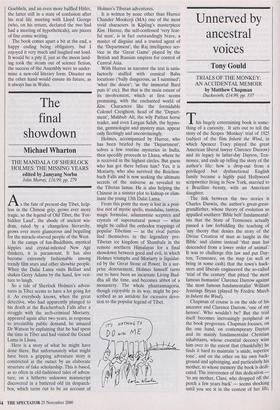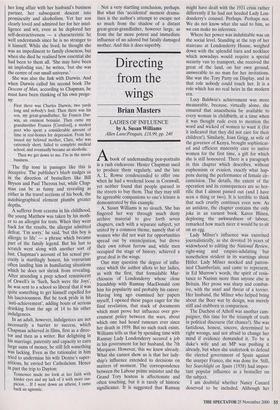Unnerved by ancestral voices
Tony Gould
TRIALS OF THE MONKEY: AN ACCIDENTAL MEMOIR by Matthew Chapman Duckworth, £14.99, pp. 337 This hugely entertaining book is some- thing of a curiosity. It sets out to tell the story of the Scopes 'Monkey' trial of 1925 (subject of the film Inherit the Wind, in which Spencer Tracy. played the great American liberal lawyer Clarence Darrow) and its legacy in latter-day Dayton, Ten- nessee, and ends up telling the story of the author's life: how a drop-out from a privileged but dysfunctional English family became a highly paid Hollywood scriptwriter living in New York, married to a Brazilian beauty, with an American daughter.
The link between the two stories is Charles Darwin, the author's great-great- grandfather, whose theory of evolution so appalled southern 'Bible belt' fundamental- ists that the State of Tennessee actually passed a law forbidding the teaching of `any theory that denies the story of the Divine Creation of man as taught in the Bible' and claims instead 'that man has descended from a lower order of animal'. It was to challenge this law and put Day- ton, Tennessee, on the map (as well as bring in some cash) that the town's huck- sters and liberals engineered the so-called `trial of the century' that pitted 'the most famous humanist' Clarence Darrow against `the most famous fundamentalist' William Jennings Bryan (played by Fredric March in Inherit the Wind).
Chapman of course is on the side of his ancestor and Clarence Darrow, 'one of my heroes'. Who wouldn't be? But the trial itself becomes increasingly peripheral as the book progresses. Chapman focuses, on the one hand, on contemporary Dayton and its mainly fundamentalist Christian inhabitants, whose essential decency wins him over to the extent that (thankfully) he finds it hard to maintain 'a snide, superior tone', and on the other on his own back- ground and upbringing, and particularly his mother, to whose memory the book is dedi- cated. The irreverence of this dedication 'to my mother, Clare, who dropped off the perch a few years back' — seems shocking until you see it in the context of her life, her long affair with her husband's business partner, her subsequent descent into promiscuity and alcoholism. Yet her son clearly loved and admired her for her intel- ligence and wit, even as he deplored her self-destructiveness — a characteristic he well understands since he is no stranger to it himself. While she lived, he thought she was an impediment to family closeness, but when she died he realised how essential she had been to them all. 'She may have been an imploding sun,' he writes, tut she was the centre of our small universe.'
She was also the link with Darwin. And when Darwin called his second book The Descent of Man, according to Chapman, he must have been thinking of his own proge- ny:
First there was Charles Darwin, two yards long and nobody's fool. Then there was his son, my great-grandfather, Sir Francis Dar- win, an eminent botanist. Then came my grandmother Frances [Comfordi, a modest poet who spent a considerable amount of time in rest-homes for depression. From her issued my beloved mother, Clare, who was extremely short, failed to complete medical school, and eventually became an alcoholic.
Then we get down to me. I'm in the movie business.
The flip tone in passages like this is deceptive. The publisher's blurb nudges us in the direction of bestsellers like Bill Bryson and Paul Theroux but, while Chap- man can be as funny and revealing as either in the travel sections of his book, the autobiographical element plumbs greater depths.
A sufferer from eczema in his childhood, the young Matthew was taken by his moth- er to an allergist for tests. When they went back for the results, the allergist admitted defeat. 'I'm sorry,' he said, 'but this boy is allergic to life' — a phrase which became part of the family legend. But his lust to scratch went along with another sort of lust. Chapman's account of his sexual pre- cocity is startlingly honest, his voyeurism often landing him in humiliating situations which he does not shrink from revealing. After attending a prep school reminiscent of Orwell's in 'Such, Such were the Joys', he was sent to a school so liberal that it was quite something to get himself expelled for his lasciviousness. But he took pride in his `anti-achievement', adding bouts of serious drinking from the age of 14 to his other indulgences.
In an adult, however, indulgences are not necessarily a barrier to success, which Chapman achieved in films, first as a direc- tor and then as a writer. But delighting in his marriage, paternity and capacity to earn large sums of money, he still felt something was lacking. Even as the rationalist in him tried to undermine his wife Denise's super- stitions, he envied her Catholicism. Hence in part the trip to Dayton:
Tennessee made me look at her faith with kinder eyes and my lack of it with more sus- picion... If I went down an atheist, I came back an agnostic.
Not a very startling conclusion, perhaps. But what this 'accidental' memoir drama- tises is the author's attempt to escape not so much from the shadow of a distant great-great-grandfather, however large, as from the far more potent and immediate influence of an adored but fatally damaged mother. And this it does superbly.






























































































 Previous page
Previous page